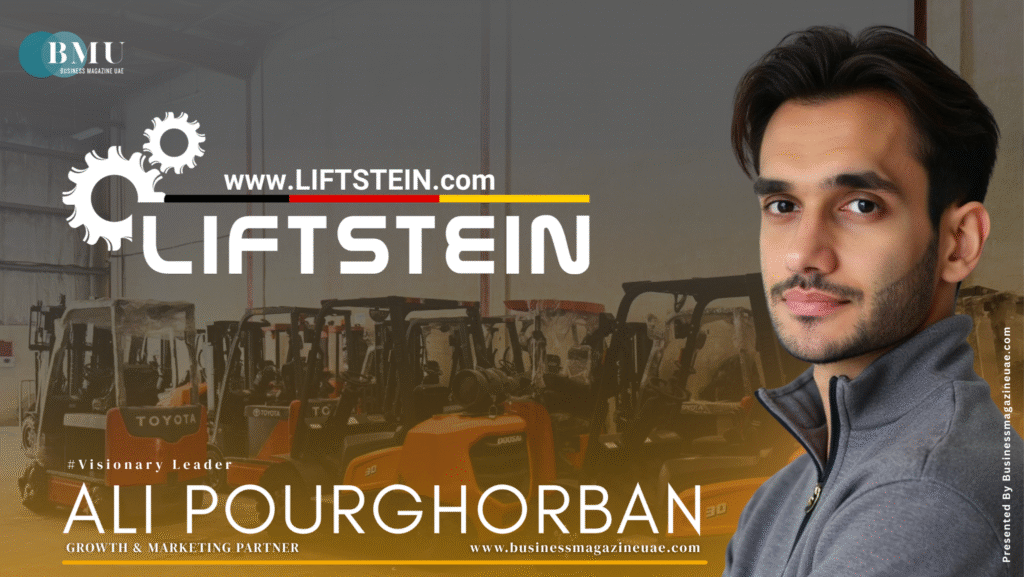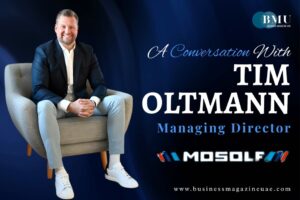
We recently had the opportunity to interview Ali Pourghorban, Growth & Marketing Partner of Liftstein, a Dubai-based family-run business specializing in inspected used forklifts and material-handling equipment. With a strong focus on trust, transparency, and innovation, the company has built its reputation on redefining how customers source reliable used equipment in a traditionally operated offline sector with limited visibility.
Liftstein’s mission is simple but ambitious: transforming the used material-handling industry into a modern, transparent, and globally accessible marketplace. Rooted in the UAE and GCC but with a vision that extends worldwide, Liftstein aims to bridge supply and demand by offering quality equipment backed by rigorous inspections and clear standards. As among the key figures behind the company, Ali Pourghorban has leveraged his expertise to contribute to the growing success of Liftstein.
Spark Behind the Journey
We started the interview by asking, “What first inspired you to pursue your current industry or professional path? Was there a defining moment or influence that shaped your direction?”
Ali shared, “Coming from a business-oriented family, entrepreneurship has always been part of our identity. With a background in International Management, I was determined to channel that spirit into building something meaningful. The used forklift industry stood out because we saw a clear gap in the Middle East. It is a very traditional sector with little digital presence and limited transparency for end users.
The UAE, with its world-class logistics infrastructure and standardized warehouse environments, provided the perfect setting to change that. Our mission became making the process of sourcing reliable equipment more accessible, professional, and trustworthy—redefining how customers approach this industry.”
Adaptability Amidst Challenging Phases
Challenges are an inevitable part of every professional journey. To learn how Liftstein overcame the tough phases, we asked Ali Pourghorban, “Can you describe one significant challenge you’ve faced in your career or business, and how you successfully overcame it?”
He responded, “One of the biggest challenges we faced early on was building trust in a market where used forklifts were often misunderstood. Many small businesses and startups believed that buying a brand-new off-brand unit would save them money, but in reality, the long-term maintenance costs made those machines far more expensive than choosing a well-known used brand.
We overcame this by focusing on education and transparency. We introduced our ‘Inspected • Approved • Ready’ standard to guarantee that every machine meets strict criteria before being listed. At the same time, we built an online-first model that made it easier for customers to see exactly what they were getting. This combination helped shift mindsets and prove that trusted used equipment is the smarter, safer, and more cost-effective choice.”
Potential Trends of the Future
We further asked, “What key trends or changes do you foresee shaping the future of your industry over the next 3–5 years?”
“We see several key trends reshaping the material-handling industry in the Middle East. The rapid growth of e-commerce and logistics will continue to drive demand for reliable forklifts, as warehouses become even more central to the region’s economy. At the same time, sustainability is becoming a priority, and we expect to see a major shift toward electric and hybrid equipment as companies look for both efficiency and environmental responsibility.
Another important trend is digitalization. For too long, this industry has relied on traditional methods, but the future is online-first and data-driven. Artificial intelligence will also play a growing role in predictive maintenance, smarter fleet management, and better purchasing decisions. We see ourselves at the forefront of these shifts, aligning our operations with the standards of tomorrow,” Ali added.
Plans we asked Ali Pourghorban
Intrigued to learn about the long-term aspirations of the company, we asked Ali Pourghorban to share more about the strategies the team will implement to reach them.
Ali explained, “Our long-term aspiration is to build a global digital marketplace for used material-handling equipment—one where every unit is properly inspected and documented, giving buyers worldwide the confidence to purchase across borders. While our roots are in the UAE and GCC, our vision is much broader: to make reliable equipment accessible internationally, bridging supply and demand with transparency at the core.
To achieve this, our strategy focuses on three areas: expanding our inventory with a diverse range of leading brands, strengthening our digital presence so customers can explore and compare equipment seamlessly online, and integrating technologies like AI and data analytics to improve efficiency and decision-making. Combined with our focus on long-term customer relationships, this approach positions us to transform how used equipment is sourced and sold globally.”
Transforming Industries with AI
Technological advancements are redefining the way businesses operate. To learn more, we asked Ali Pourghorban, “How does Liftstein look forward to implementing artificial intelligence and emerging technologies in its business model?”
He mentioned, “Artificial intelligence and emerging technologies are set to transform our industry in profound ways. AI can help us standardize inspections, ensuring consistency and providing customers with transparent reports they can trust—even from overseas. It also has the potential to forecast demand, optimize pricing, and guide buyers toward smarter decisions.
Beyond AI, we see opportunities in predictive maintenance, IoT-enabled equipment, and even blockchain solutions for verifying ownership and transaction history. These innovations all push the industry toward greater trust and efficiency. With our digital-first approach, we are well-positioned to adopt and integrate these tools as they evolve.”
Values Guiding Liftstein Forward
Interested to learn more about the core values that influence the company’s decisions and the way it operates, we asked Ali to share more about the same.
Ali explained, “Our work is built on three guiding principles: trust, transparency, and responsibility. Customers deserve complete clarity when making an investment, which is why our standard, ‘Inspected • Approved • Ready,’ is more than a slogan—it reflects the way we operate.
As a family business, integrity and long-term relationships also play a central role in how we work. We see every client not as a one-time buyer but as a partner we want to support over the long run. At the same time, we embrace innovation. By bringing a traditionally offline industry into the digital space, we aim to deliver not only reliable machines but also a modern, efficient, and accessible customer experience.”
Embracing Innovative Practices for Success
Innovative practices play a key role in the success of a business. So, we asked, “Can you share an innovative strategy or approach that helped Liftstein stand out or achieve a breakthrough?”
“One of the most impactful strategies we introduced was transforming our inspection process into a clear quality benchmark that customers could recognize and trust. Instead of making inspections a background activity, we made them a visible part of our business, showing buyers exactly how and why each unit met our standards before being listed.
We also placed a strong focus on education. Rather than simply selling machines, we took the time to explain why a well-known, high-quality used brand is often a smarter investment than a brand-new off-brand alternative. This helped us change customer perceptions and build long-term trust.
It is important to note that we do not offer warranties. Instead, our model is based on rigorous upfront inspections and transparency, ensuring customers know exactly what they are getting,” Ali commented.
Liftstein’s Leadership Journey
Lastly, we asked, “How has Liftstein’s leadership style evolved throughout its journey, and what lessons have shaped the company’s approach to leading teams or businesses?”
“Leadership at Liftstein has never been about one person alone. From the very beginning, it has been a shared responsibility shaped by the fact that we are a family business. In the early days, we were very hands-on, involved in every detail to ensure our vision was being carried out. Over time, we learned that effective leadership is less about doing everything ourselves and more about setting clear standards, building reliable systems, and trusting people to deliver within them.
What has guided us is long-term thinking, resilience, and adaptability—qualities that come naturally when you know your work carries the weight of family reputation. The most important lesson has been that leadership is not just about direction, but about clarity, consistency, and creating a culture where everyone knows the standard and feels empowered to meet it,” Ali shared.
To learn more about the journey of Liftstein, visit https://liftstein.com or follow on LinkedIn.
You can also connect with Ali Pourghorban on LinkedIn for further insights.
Also Read:
According to the CEO, Dubai Airport will Reach the 100 Million Passenger Milestone in Two Years







